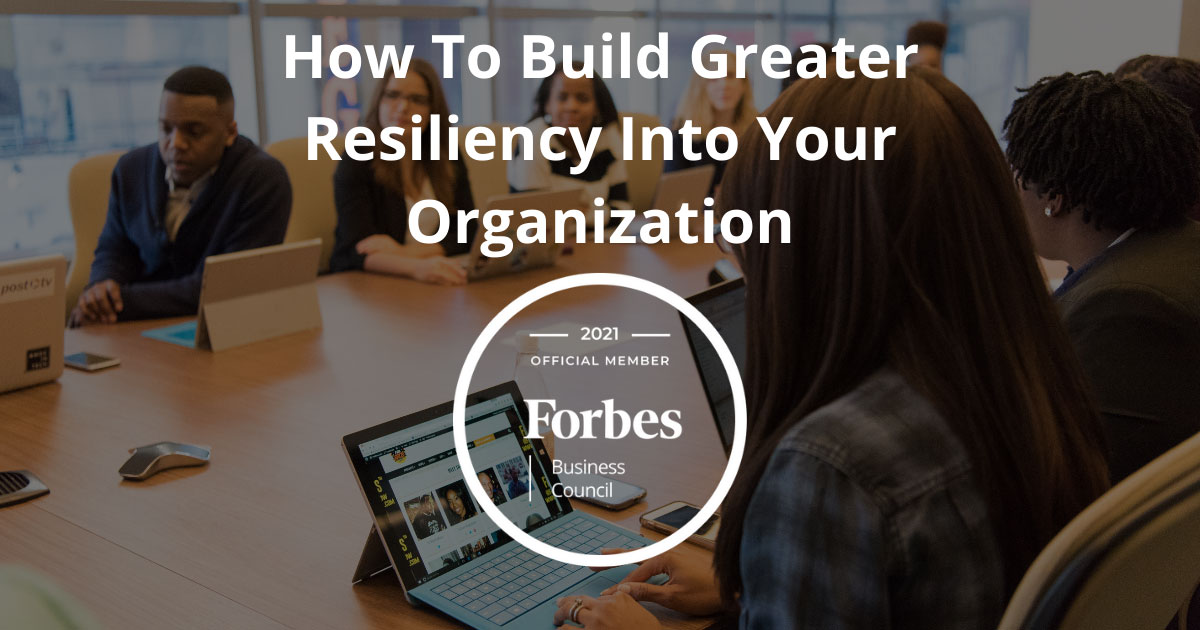It’s one thing to succeed in business when things are going well; it’s another to thrive during times of uncertainty. In trying circumstances, resilient organizations and teams are likely to bounce back quickly or not be affected at all. Conversely, those with less resiliency will struggle to meet changing needs and may never truly recover.
By bolstering resiliency in your company and your team, you’ll be better poised to successfully face any challenges that come your way. Below, the members of Forbes Business Council shared 15 ways you can build greater resiliency in your organization.
1. Develop Strong Team Relationships
Small business leaders can build resiliency by building strong personal relationships with the team so they feel they are part of the business. When I started my company 10 years back, I used to talk to each of my team members every day. This made everyone proactive in the company and helped us avoid mistakes, which in turn created resiliency in the company. – Piyush Jain, Simpalm
2. Enable Team-Wide Open Communication
Small business leaders need to enable team-wide open communication, meaning that leaders should have real connections with their managers, and managers, in turn, need to establish real connections with their team members. With real communication, team members are resilient and adaptable because they are able to share their challenges and uncertainties, ultimately learning how to overcome them. – Udi Dorner, SetSchedule
3. Don’t Be Afraid To Be Vulnerable
Great leaders are not afraid to be vulnerable. When leaders admit they don’t have all the answers, make mistakes and use those mistakes as learning lessons to evolve, they set the course throughout the organization. When team members see this in their leaders, they are willing to push through challenging times and resiliency permeates. – Damon Lembi, Learnit
4. Focus On Company Culture
Foster a transparent and inclusive culture with open communication that offers a safe space for your team to voice their feedback. Transparency and inclusivity build trust and loyalty. Providing avenues for open communication through team meetings and workshops keeps employees engaged. Focusing on building a strong culture will lead to a company’s long-term resilience. – Peggy Choi, Lynk
5. Establish Airtight Operational Structures
Resilience is key for small businesses to scale. Leaders focus on growth, but you need airtight operational structures so when problems arise, you pivot without disruption. Many small businesses fail due to cash flow issues and a lack of resources for small businesses. Find solutions that offer more than cash or a business checking account with the ability to make and receive direct payments fast. – Hany Fam, Markaaz
6. Teach The Skill Of ‘Letting Go’
Making them learn the skill of “letting go.” If leaders start to understand and learn how to recover from any difficult situation or conversation quickly, it will give rise to an open and candid conversation culture. Energy flows from top to bottom. If we normalize making mistakes and learning from them, there is no way organizations won’t be successful! – Neha Madaan, Vanator
7. Share Employees’ Stories
Community stories build collective resiliency. Listening, sharing and communicating individual employee’s resiliency makes for a culture of respecting diverse narratives. Layer on top reassurances of the organization’s moral values so all feel aligned and heard, thus finding true meaning in their work. This increases empathy and grows the muscle of resiliency. Share by employee highlights and open-ended conversations. – Silvia Mah, Ad Astra Ventures
8. Treat Everyone With Kindness
Lead by example. Treat everyone, from the intern bringing in breakfast to the CEO in the elevator, with exceptional kindness. This simple thing, done altruistically from the top down, will cultivate a culture of positivity. Then use that to attract and retain top talent and you’ll be as resilient as they come. – Angela Diffly, Restaurant Technology Network
9. Build Strong Intangible Capital
Continuously build strong intangible capital. If the leader is focused on mitigating risks, they will be able to recover quicker—or not need to recover at all—as their organization may power through a major hurdle or change in climate. If you have strong people, strong processes, strong systems, engaged customers and a great culture, this will build resiliency into the company. – Scott Snider, Exit Planning Institute
10. Identify Strengths And Prioritize Autonomy
Small business leaders can build resiliency into their organization by identifying their organization’s unique strengths and placing a stronger emphasis on autonomy. When problems or opportunities present themselves, the team’s ability to improvise, create new pathways and act by making decisions quickly can be a strong promoter of resiliency, especially in times of uncertainty. – Loubna Noureddin, Mind Market LLC
11. Decentralize Standard Tasks
To build resiliency, small businesses need to decentralize standard tasks to ensure that the one person at the top isn’t the only one who can keep things moving. Strong processes can also minimize decision-making fatigue on a case-by-case basis. Training and processes provide a strong foundation for successful employee engagement and scalability, both of which are needed for long-term resiliency. – Shannon Brooks, Shannon Brooks Consulting
12. Invest In Employee Well-Being
Invest in prevention and education for your employees so they can effectively manage stress. By putting your team’s holistic wellbeing first, you can ensure that they have the vitality and energy to manage any challenge that comes their way. This will fuel more proactivity instead of reactivity, as well as more exploration and creativity instead of rumination so your team and business can thrive. – Andreea Vanacker, SPARKX5
13. Demonstrate An Agile Mindset
If leaders are able to roll with the punches, it sets an expectation for teams to do the same. Taking an opportunity to pivot as required and show that it’s strategic to do so is powerful. – Muraly Srinarayanathas, Computek College
14. Encourage Employee Creativity
Many entrepreneurs tend to be control freaks who tend to micromanage everything. To build resilience, encourage creativity among your employees. By doing so, your organization will become adaptive to change. The end result of having a creative organization is that it will create resilience and give you the opportunity to adapt and pivot on the fly to changing business conditions. – Adam Coffey, CoolSys
15. Use Constant, Clear Communication
No one likes being kept in the dark, and employees form a stronger bond when they can trust and rely on one another. Keeping employees in the loop, staying transparent and keeping the door open is a great way to create a solid foundation. By using an open forum, listening and responding, business leaders can establish a strong bond with their organization. – Steve Byrne, EquiSource
This article was also published on Forbes.com

